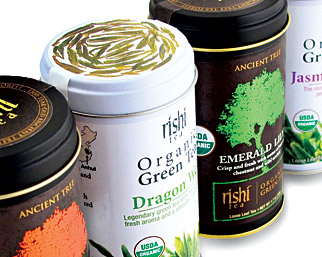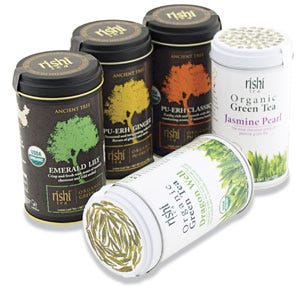Shipping tea with care
January 30, 2014


Rishi 1
For Rishi Tea, a Milwaukee-based importer, organic tea is its passion. It's what Rishi does best. The company imports tea certified under USDA-National Organic Program (NOP) or fair-trade regulations, directly from tea gardens and sells it to wholesale customers and consumers in the U.S. and internationally. With distribution in Korea, Scandinavia, Japan, Mexico, Guatemala and other locations, the teas are available in Whole Foods stores nationwide and in Canada, as well as specialty food shops, natural health food stores and in cafés and restaurants across the U.S.Rishi blends various combinations of teas to produce the richest, most-complex flavors. At the same time, the company strives to provide quality products while trying to be kind to the environment. The fine teas include: Lush African Rooibos; exotic Ancient Tree Tea; black tea; caffeine-free botanical blends; Chai green and refreshing iced tea; as well as Oolong, Pu-erh from China; white; organic and botanicals; and Yerba Maté—all in assorted exotic and enticing flavors such as Peach Rooibos, Emerald Lily, Citron Green, Jasmine Pearl, Hoiujicha and even something called Dragon Well.
Rishi not only packages teas but it also offers a variety of tea-related products, such as teaware, tea sets, accessories, teapots, giftware and more fragile items that require an extra degree of cushioning.
Rishi's organic Fair Trade-certified line of products exemplifies its commitment to direct trade with farmers at origin. Partnering with other socially and environmentally committed organizations to educate consumers on the benefits of organic and sustainable living, the company has formed a team to execute its values into its daily business practices. “We constantly strive to implement changes that best represent our business practices,” says co-owner Benjamin Harrison.

Rishi 2
Rishi recently began using Cell-O® biodegradable air cushions from FP Intl. to protect, brace and block the tea products in shipment and maintain its environmentally-friendly efforts. Part of FP's Green Family of environmental products, the cushions are 100-percent-biodegradable in the presence of micro-organisms, FP says, and are made to perform with a minimal carbon footprint.Supplied to Rishi by FP's distributor, American Paper & Packaging, the cushions also eliminate humidity and infestation problems associated with biodegradable options such as starch-based packing materials. “We were actually one of the very first companies to use this cushioning,” explains David Closner, Rishi's production manager. “We didn't have many options when looking for environmentally friendly cushioning and FP was a trusted company we have worked with in the past. They were willing to go the extra step and provided a machine to help us evaluate the percentage of air each cushion requires.”
Randy Green, marketing and sales administrator at FP, says his firm makes the cushions using a 100-percent-recyclable, single-layer blown LDPE film. The film contains a proprietary additive that allows the product to degrade in the presence of micro-organisms within nine to 60 months.

Rishi 3
Microorganisms are key

Rishi 3
“The additive doesn't affect the performance or shelf life of the cushioning because biodegradation only occurs in the presence of microorganisms in landfills, home and commercial composting and other areas where they exist in nature,” Green says. “The additive promotes the formation of a microscopic bio-film on the surface of the cushions, which attracts microorganisms. The microorganisms secrete acids and enzymes that breakdown the long polymer chains into smaller pieces, which they can then digest. This additive is used in numerous plastic products throughout the world.”
Green goes on to say that the eco-friendly packaging products will biodegrade in aerobic (with air) and anaerobic (without air) conditions. But they can also be reused indefinitely. The Cell-O cushions are printed with a “green” shipping message reflective of Rishi's own environmental philosophy.
Because they're 99-percent air by volume, the cushions take up less than 1 percent by volume of the original packaging when deflated. “The primary environmental benefit of air cushions is that after they're used and deflated, their size is reduced to a small fraction. We provide the conditions in which the cushions biodegrade as well as the timeframe. A statement is provided that reads, 'Biodegradable CELL-O® air cushions, biodegrade in nine to 60 months in the presence of microorganisms, reusable and recyclable.' We also provide a recycling log with the number four to indicate the type of plastic the cushions are made of for recycling.”
Reducing the carbon footprint

Rishi 4
Replacing some of FP's conventional cushioning products that do not biodegrade, Rishi wanted to reduce its carbon footprint as well as the amount of petroleum-based products its ships to customers. It also wanted a protective cushioning that could meet its “green” initiatives, says Alan May of American Paper & Packaging, which also provides Rishi with its corrugated shipping cases. “We were able to show Rishi that they could probably use less inner packing material than they used before and get the benefits of a biodegradable cushion,” he says.Primary packaging for the teas, which are either loose-packed, stick-packed, bagged or vacuum-packed, include round, white and dark brown metal tins sourced from China. The tins hold 1.5 to 4 oz. Other teas such as powdered iced tea in 5-qt pouches and Japanese Shencha green tea-leaf powder are filled into filter bags or single-serve stick-packs that are loaded into post-consumer-recycled paperboard folding cartons printed with soy inks by Imperial Lithographing. The paper stock, from Lindenmeyr, is made with 100-percent wind-energy on 80-percent post-consumer waste, processed chlorine-free with soy ink.
In many instances, the packages are also stamped with the USDA Organic seal, a kosher certification and other organic certification marks.
After FP introduced May to the new Cell-O biodegradable cushions, he shared the product's biodegradable details with Rishi, and the company decided to sample a roll of the new cushioning early this year.
After the tea is blended, Rishi hand-packs it on four assembly lines at its Milwaukee tea-production facility into the retail tins, which are hand-labeled at a packing station. Bulk items are bagged.
Closner says that many of the loose teas are filled into the tins by hand and the Japanese teas and a few of the Chinese teas arrive at Rishi's plant prepackaged and vacuum-sealed from the tea-producing origin. “The stick-packs are also individually packaged in Japan but we hand-pack them into cartons here in Milwaukee,” he says. “We also use the cushioning to protect our teaware in shipment.”
Seeing that the versatile packing material could inflate enough to work well with its shipping cases, tea tins and cartons, Rishi soon ordered its first shipment of the material and companion equipment. Rishi produces its biodegradable cushions on-site, on-demand using FP's Cell-O EZ II machine, a semi-automatic tabletop system with a film-roll dispenser stand.
The machine uses preconfigured, perforated film rollstock that takes about 15 sec to load. A self-contained air supply allows the machine to produce small cushions at speeds up to 49 lineal ft/min and larger cushions at up to 32 lineal ft/min.
An operator loads the different tea tins or cartons into a shipping case and then activates the machine. The machine automatically sets the amount of air fill and the seal temperature. FP says that one roll of 8-in.-wide Cell-O Double Cushion® 1.2-mil-thick film can produce continuous chains of perforated air cushions in various sizes. Two cushion sizes are offered: 8x14 in.; and 8x7.5 in. The cushions feed into a large mesh accumulating bin and are ready to use.

Rishi 5
Protect and preserve

Rishi 5
According to Harrison, Rishi's move to Cell-O biodegradable cushioning is just one step in the company's sustainability initiative. “Our transition to FP's biodegradable Cell-O air cushions was a clear and natural progression, inspired by our many other green efforts, including printing marketing materials on 100-percent post-consumer-waste paper that's chlorine free, composting used tea leaves and moving to environmentally sustainable packaging for our organic iced tea line,” he says.
Packaging for the organic teas uses 100-percent-renewable wind energy and 50-percent post-consumer waste paper, Harrison points out. “We hope customers and businesses alike realize the importance and ease of living a cleaner life to better protect and preserve our planet.”
With its upgraded packaging process, Rishi is steeped in satisfaction with the air-filled cushions. The amount of product it packages on a daily basis varies by the season, Closner says. “We generally pack a lot more product in the winter months. The cushioning provides sufficient protection for our products, which means less damage. We are definitely pleased with our move to the biodegradable Cell-O cushions, but actually, we haven't yet had the need to compost any of the cushions,” Closner tells PD. “We reuse them as much as we can.”
More information is available: |
FP Intl. Inc., 800/866-9946. www.fpintl.com |
American Paper & Packaging, 414/462-8560. www.americanpaper.com/contact.cfm |
Imperial Lithographing Corp., 800/726-3187. http://imperial-vc.com |
Lindenmeyr, 914/696-9300. www.lindenmeyr.com |
About the Author(s)
You May Also Like


